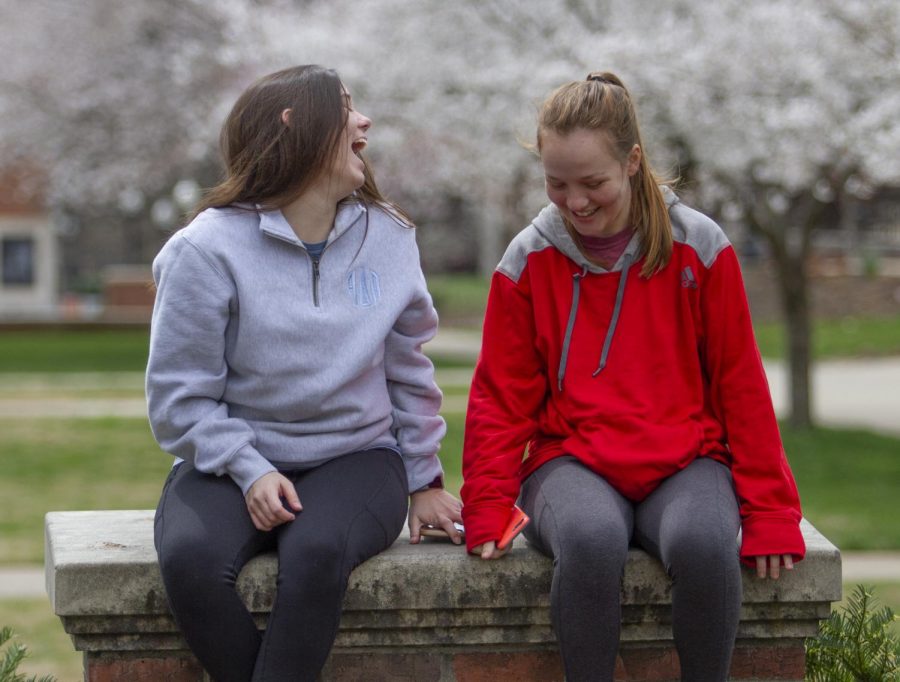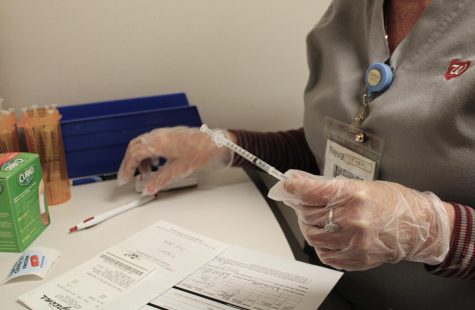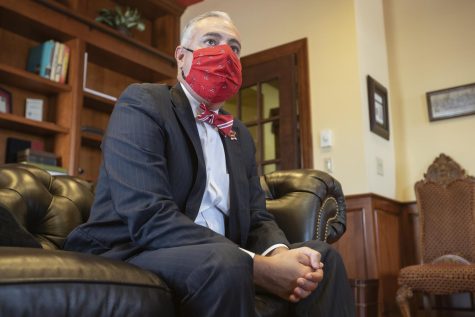WKU students grapple with new reality due to COVID-19
May 8, 2020
This story was published in the May 8 final print issue. Read the full issue here.
After nearly four years at WKU, senior David Breidenich is searching for a new routine.
Breidenich, a history and social studies major from Independence, was teaching at Allen County-Scottsville High School before the coronavirus forced him to make changes.
WKU announced March 17 it was moving to online-only classes for the rest of the semester due to COVID-19. Breidenich’s school moved to a non-traditional instruction format on the same day.
Since the high school moved to a non-traditional instruction format, the teacher Breidenich works under has only given him a few online tasks, he said.
Breidenich is searching for teaching positions for after graduation, and he’s focusing on what’s available in northern Kentucky, he said.
“I make sure to look at job postings every day,” Breidenich said. “I’ve been trying to polish up my resume.”
Since his responsibilities as a student teacher have decreased, Breidenich recently joined a lawn care service crew, which was something he did this past summer as well.
“There’s a lot of fulfillment and satisfaction in it,” Breidenich said. “My body is still trying to readjust to the heavy work regimen.”
Because of COVID-19 Breidenich said he wears a mask on the job site. In order to limit social interaction with his coworkers Breidenich doesn’t ride in a company vehicle to the job site. He provides his own transportation instead.
“The workload has not changed,” Breidenich said. “It’s pretty much the same.”
Landon Oliver, a senior interdisciplinary studies major from Hendersonville, Tennessee, was a lab assistant at the Jody Richards Hall computer lab before it shut down on March 26.
“The first thing that came to mind was, wow, I don’t know what to do,” Oliver said. “I can live here in my apartment, but there only is so much that we can do.”
A few of his professors have decreased their course workload, Oliver said.
“Some of my classes didn’t have too many assignments already,” Oliver said.
Oliver said he had applied for a few internships, but he’s wondered if any of those positions will actually be filled if COVID-19 continues to place limits on opportunities. If he doesn’t secure an internship, Oliver said he will try to look for another source of income.
“We still have classes, but they’re only online, so that gives me some time to focus and understand where I need to go,” Oliver said.
Victoria Terhune, a junior psychology and communication studies major from Louisville, said studying at home is difficult because her house is too noisy and busy. She works on homework for three to four hours a day.
“I’ve had to clearly set boundaries and times for myself to do homework instead of spending time with my family,” Terhune said. “I try to keep my afternoons or evenings open to socializing with friends and family.”
Terhune hopes by next semester campus and classes will be back to normal.
“I’m trying to be optimistic about it all,” Terhune said.
This challenge has particularly hit programs like the fine arts, where in-person tools or instruction feels necessary. Amanda Clark, coordinator of the WKU dance program, said making the shift to digital learning has been “quite difficult.”
“Most of our classes are movement based courses where students are on their feet and working through a physical modality,” Clark said. “They’re using their bodies as instruments to embrace theories and research ideas.”
Clark said the initial plan was to focus on the theoretical side of dance. After in-person classes were cancelled for the rest of the semester though, Clark said some adjustments had to be made.
“We are all doing a mixture of readings, online video viewing, discussions, written responses and movement-based exercises,” Clark said. “I plan to meet with all of my classes each week via Zoom. I believe the ‘face-to-face’ interaction is important for the students right now.”
Clark said the adjustment to Zoom has been tough, since it is difficult to teach a movement-based class over a teleconference.
“Being able to fully see 15-20 moving bodies on a laptop screen restricts the amount of feedback I am able to give or corrections that I can provide,” Clark said. “As a result, students are learning how to take greater ownership over their movement execution and self-cueing abilities.”
Cassie Duffy, a junior dance major, said she had to make some changes to adjust to online learning.
“I just never imagined having to find a space for me to dance,” Duffy said.
Duffy said the biggest challenge she has encountered with the change to online learning is a lack of space to do her movements. She said she has a lot of large objects in her room that rob space.
“I try to focus on what is a weak point of that movement that maybe I can focus on, rather than the whole movement,” Duffy said.
David Young is head of WKU’s Department of Theatre and Dance. He said it has proven difficult to recreate a dance or acting class online.
“It’s not a perfect solution for those of us in the arts,” Young said. “I know some of the acting teachers were going to switch over to asking students to work on monologues and submit them as a video.”
Theatre and dance are not the only programs that are seeing challenges. Kristina Arnold, head of WKU’s art department, said she and her colleagues are finding different ways to get around the online-only problem.
“We have specific studio spaces in which to work, with specialized tools and equipment and rely heavily on in-class demonstrations, hands-on experimentation and problem-solving, immediate feedback and group conversations,” Arnold said in an email. “Every faculty member is in the process of figuring out ways to modify their class projects to literally fit inside a student’s living room.”
Arnold said one solution has been allowing students to take art supplies home to use for their projects, like clay and carving tools.
“We know our students won’t have a woodshop or an etching press available, so we’re changing requirements so that they are able to use what they do have readily available,” Arnold said.
Fine arts students are not the only ones who have had to make adjustments to their learning. Joe Lewis, a meteorology major from Owensboro, said his classes have done “a complete 180.”
“It’s turned into a lot of paperwork,” Lewis said. “It’s something I haven’t done since freshman year, so its been really tedious.”
Lewis works as a desk assistant at WKU and said he came back to campus for a week before the university moved to online classes for the rest of the semester. Lewis said he thinks the university has handled the crisis “perfectly.”
“I believe that if we stayed open it would have been terrible,” Lewis said. “People would have been getting sick left and right. I feel like we have a grasp on what’s happening and what we need to do.”
News reporter Jack Dobbs can be reached at [email protected]. Follow him on Twitter at @jackrdobbs.
News reporter Leo Bertucci can be reached at [email protected]. Follow him on Twitter @leober2chee.




















